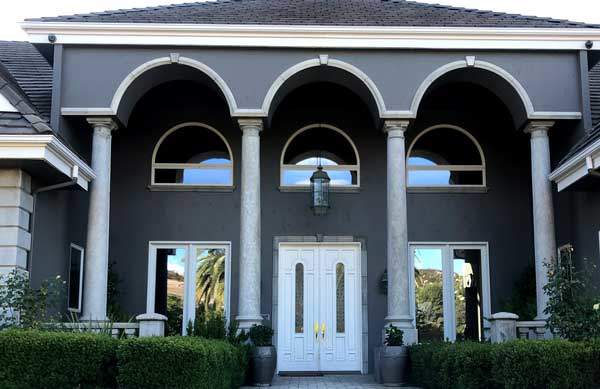How Residential Home Window Tinting Enhances Your Home's Power Efficiency
Residential home window tinting offers an engaging service for home owners looking for to improve energy efficiency within their living areas. By applying specialized movies to windows, it successfully reduces warm transfer, thus stabilizing indoor temperature levels and lessening the demand for excessive home heating or air conditioning.
Recognizing Home Window Tinting
Recognizing home window tinting is important for house owners seeking to enhance both comfort and energy effectiveness in their living spaces. Residential Window Tint. Home window tinting includes the application of a thin movie to the interior or exterior surface of glass home windows. This film can substantially regulate the quantity of sunshine and heat that gets in a home, therefore affecting indoor climate conditions
There are various sorts of home window tinting films offered, each with distinct homes. Colored movies take in solar energy, while reflective movies disperse it away from the glass surface area. Ceramic movies use a balance of presence and warm rejection, making them a preferred selection amongst property owners. The performance of window tinting is typically determined by its Visible Light Transmission (VLT) percent, which shows just how much light can go through the film.
Advantages of Energy Performance
Window tinting not just enhances appearances yet also plays a considerable duty in enhancing energy performance within residential areas. By reducing warm transfer through windows, tinted movies create an extra secure interior climate, which can result in significant decreases in energy usage for heating and cooling. This power effectiveness equates into lower utility expenses, providing home owners with significant long-lasting cost savings.

Additionally, home window tinting enhances the convenience of living spaces. By reducing glow and obstructing harmful UV rays, colored windows produce a more pleasant environment, which can lead to improved well-being for residents. The security versus UV rays likewise helps maintain furnishings and floor covering from fading, adding to the longevity of house items.
Exactly How Tinting Functions
Tinting movies operate via a combination of sophisticated products and technologies created to manage the amount of solar energy going into a home. Largely made up of polyester, these films often integrate ceramic or metallic bits that reflect and absorb warmth. This double capability enables them to significantly reduce the infiltration of ultraviolet (UV) rays and infrared radiation while permitting visible light to go through.
The efficiency of window tinting is determined by its solar heat gain coefficient (SHGC), which shows just how much solar power is sent via the window. Reduced SHGC worths are preferable as they signify greater warmth being rejected. Furthermore, window colors can include a range of tones, permitting homeowners to personalize their visual choices while improving power efficiency.
Moreover, these movies serve as an obstacle, protecting against warm loss throughout chillier months by reflecting indoor heat back right into the living room. This thermal insulation result get redirected here enhances the cooling benefits gotten throughout warmer months, contributing to a balanced interior environment year-round. By taking care of solar power properly, domestic window tinting not just improves convenience however additionally plays a vital role in decreasing power intake and reducing energy expenses.
Picking the Right Tint

There are numerous types of home window movies readily available, including dyed, metalized, and ceramic. Ceramic movies supply exceptional warmth control without endangering presence and are extremely durable, making them a preferred choice.
Visible light transmission (VLT) is another essential variable, as it shows the amount of natural light that can go through the colored glass. House owners need to pick a tint with a VLT that matches their lighting choices while still providing ample glare decrease.
Additionally, examining the solar heat gain coefficient (SHGC) can help figure out just how well a color can obstruct warm from sunlight. A reduced SHGC shows much better heat control, ultimately enhancing energy efficiency.
Installment and Upkeep Tips
Appropriate installation and upkeep are vital parts in taking full advantage of the benefits of residential home window tinting. To attain optimal outcomes, it is advisable to hire a certified specialist for installment. This makes certain that the color is applied properly, staying clear of air bubbles, creases, or imbalance that can compromise performance. Professionals additionally utilize specialized strategies and devices, which can improve the toughness and effectiveness of the tint.
Following setup, maintenance is important to lengthen the life of the window movie. It is advised to wait at least 30 days prior to cleaning the tinted windows to enable the sticky to cure fully.
Resolving these problems promptly can avoid more damage and keep power efficiency. By adhering to these installment and maintenance suggestions, house owners can ensure their home window tinting continues to provide substantial power financial my site savings and convenience for years pop over to this site to come.
Final Thought
In verdict, domestic window tinting serves as an effective service for enhancing power effectiveness within homes. By decreasing warm transfer and obstructing harmful UV rays, home window movies contribute to decrease power usage and improved indoor comfort.
Window tinting includes the application of a slim film to the interior or outside surface area of glass windows. By minimizing heat transfer via home windows, tinted movies develop an extra secure indoor environment, which can lead to considerable decreases in power consumption for home heating and cooling.The efficiency of home window tinting is determined by its solar heat gain coefficient (SHGC), which suggests how much solar energy is transmitted with the home window. By handling solar energy effectively, property home window tinting not just improves comfort yet additionally plays an important role in reducing energy usage and reducing energy costs.
By minimizing warm transfer and obstructing damaging UV rays, window films contribute to reduce power usage and boosted interior comfort.